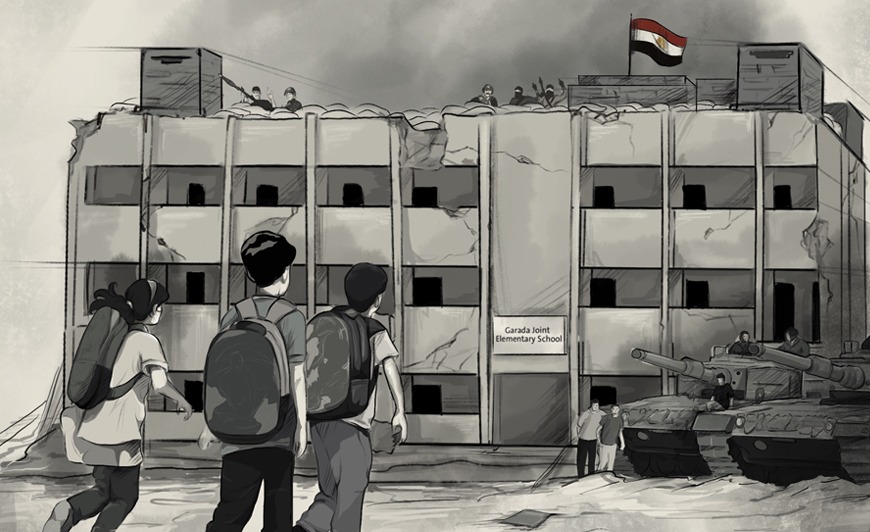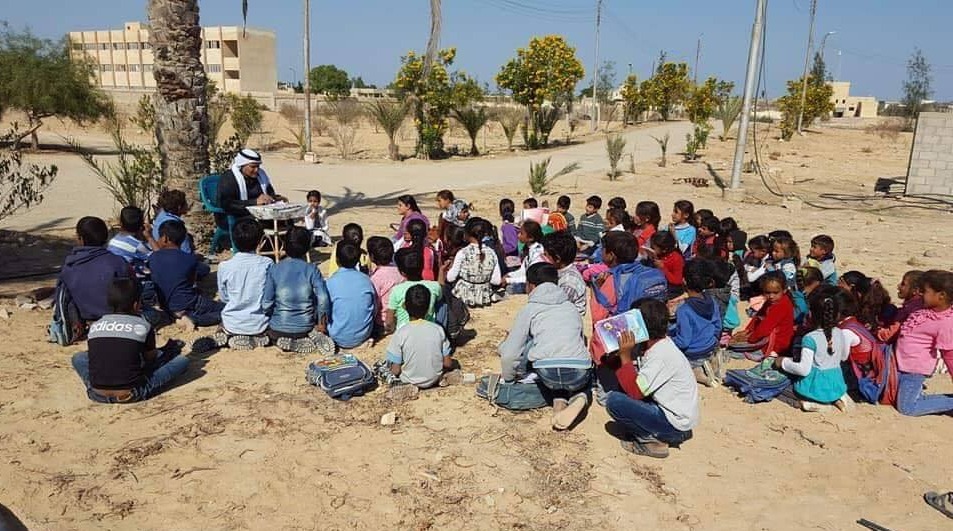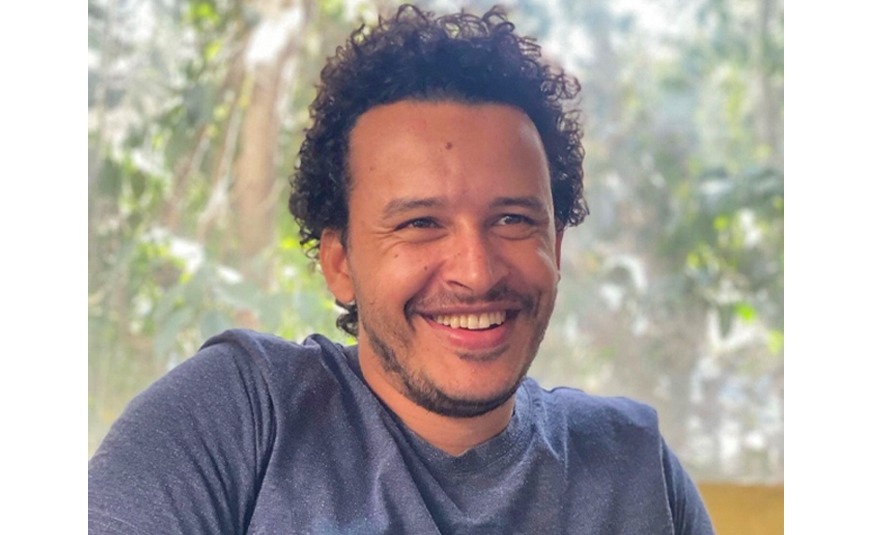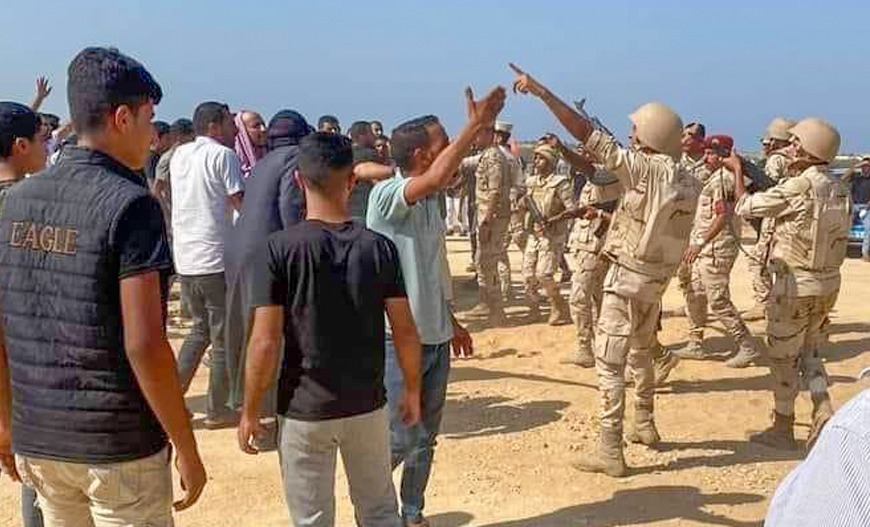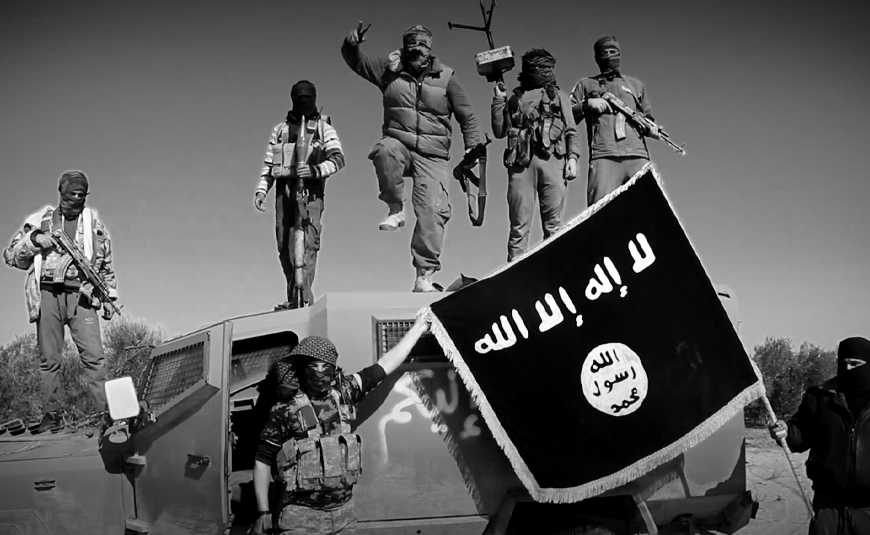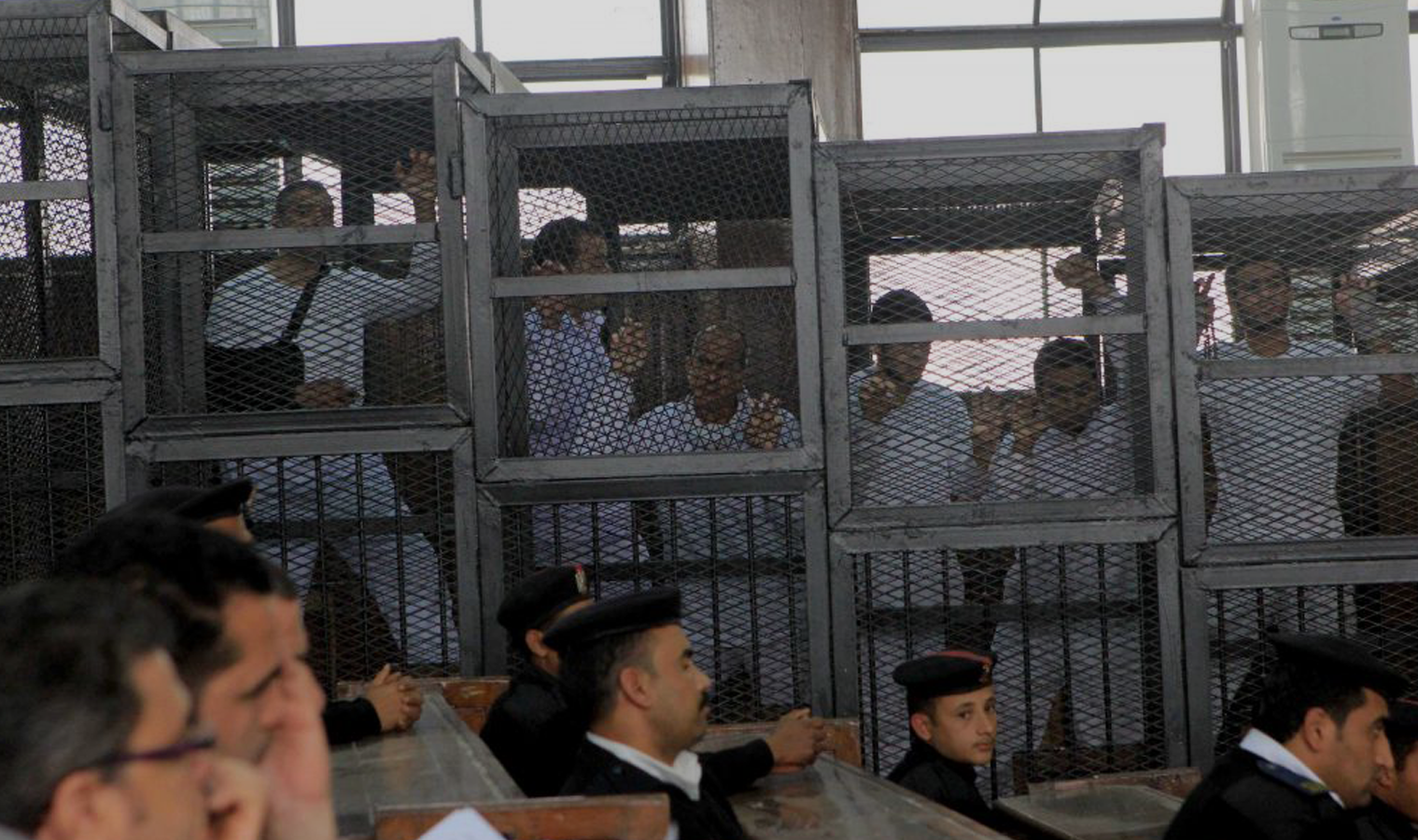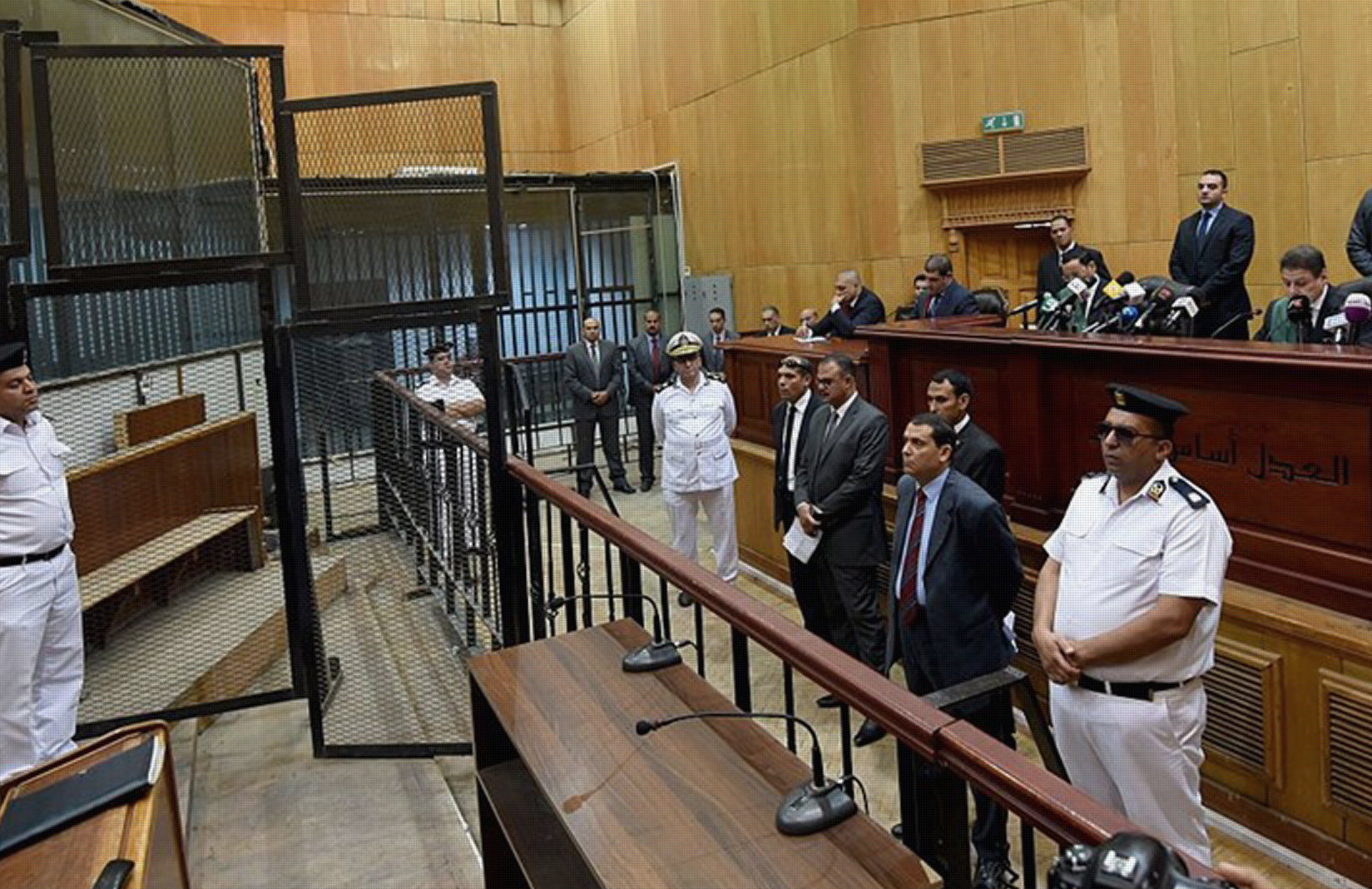
The most notable abuses that took place during January 2022
Summary:
The Sinai Foundation for Human Rights documented 6 abuses during January 2022, 3 of which were committed by each of the conflicting parties.
The foundation’s legal team documented several abuses during this month in which trials could be described as lacking the standards of fair trial where defendants were brought before the prosecution after varying periods of enforced disappearance and another was recycled into a new case and charged with joining a terrorist group, according to National Security investigations, despite his previous release orders and finishing his sentence in a previous case where he faced the same charges without being released.
On the other hand, during this month, five civilians, two of whom were children, were injured due to explosive device explosions in three separate locations in Sheikh Zuwayed. The explosives were most likely planted by ISIS members to target government forces.
Details of the abuses
Egyptian law enforcement forces abuses:
Forcibly disappeared individuals appearing in court as defendants
The Sinai Foundation for Human Rights followed trials of North Sinai civilians that lack the standards of fair trial, where the State Supreme Security Prosecution in Cairo proceeded with investigating them during January 2022 and charged them with joining a terrorist group, based on National Security investigations.
The first incident .. The foundation’s legal team documented on 5 January 2022 the appearance of the defendant Iman Hussein Hemidan before the State Supreme Security Prosecution in Cairo in relation to case number 1935 for the year 2021, where she was charged with joining a terrorist group, and the prosecution did not allow an attorney to be present with the defendant despite the attorneys’ presence inside the prosecution base. The prosecution also did not attempt to assign an attorney to be present with the defendant and ruled for the preventive detainment of the defendant till 30 January 2022.
The second incident .. was documented by the foundation’s legal team on 11 January 2022 where the defendant Mohamed Samy Hagag Ashour Badawy appeared before the State Supreme Security Prosecution in Cairo in relation to case number 1935 for the year 2021, and the prosecution did not allow an attorney to be present with the defendant despite the attorneys’ presence inside the prosecution base. The prosecution also did not attempt to assign an attorney to be present with the defendant and ruled for the preventive detainment of the defendant till 26 January 2022.
The third incident .. was documented by the Sinai Foundation for Human Rights’ legal team on 22 January 2022 where the defendant Abdullah Suliman Ali Salim appeared before the State Supreme Security Prosecution in Cairo in relation to case number 620 for the year 2021 where he was charged with joining a terrorist group. During the prosecution interrogations, the defendant stated that the actual date of his arrest was June 2016 when he was arrested and charged in case number 502 for the year 2016 where he was sentenced to 3 years in prison. The defendant served his prison sentence ordered by the military prosecution, finishing it in June 2019, however, National Security services refrained from releasing him despite him finishing out his three-year sentence and detained and subjected him to enforced disappearance in the National Security base in Ras Sidr, South Sinai, for two and a half years. During that period, the defendant was subjected to inhumane detention conditions where he was denied visitation from his family or contact with his attorney until he was transported to Cairo on Saturday, 22 January 2022 and brought before the State Supreme Security Prosecution in relation to case number 1935 for the year 2021 and was kept at Tora Reception Prison.
Looking at what the defendants stated during the interrogations, there is no doubt that many infractions and violations considered crimes in the eyes of the Egyptian law took place, in addition to the prosecution’s violation of the simplest rules and procedural guarantees stated by the Egyptian law especially in the case of initial investigations.
First: The detainment of arrested individuals without permission from the relevant judicial authorities for longer than the legal detainment period.
Article 54 of the Egyptian constitution states that: “Personal freedom is a natural right which is safeguarded and cannot be infringed upon. Except in cases of in flagrante delicto, citizens may only be apprehended, searched, arrested, or have their freedoms restricted by a causal judicial warrant necessitated by an investigation. All those whose freedoms have been restricted shall be immediately informed of the causes therefor, notified of their rights in writing, be allowed to immediately contact their family and lawyer, and be brought before the investigating authority within twenty-four hours of their freedoms having been restricted…”.
Article 36 of the Code of Criminal Procedure states that: “The criminal investigation officer shall immediately hear the statements of the arrested suspect who, if he fails to establish his innocence, shall be brought before the office of the competent public prosecutor within 24 hours. The office of the public prosecutor shall question him within 24 hours, after which it shall order either his remand in custody or his release”.
Article 40 of the same code states that: “No one shall be arrested or detained except by order of the legally competent authorities. Any person who is arrested or detained shall be treated in a manner conducive to the preservation of his human dignity and shall not be subjected to physical or mental harm”.
Second: The centers where they were detained were as they stated during investigations inhumane, and they were subjected to emotional and physical stress there. In addition, the centers are not supervised by the public prosecution and are not specified in the Prison Regulation Law or its amendments.
Third: The detainment of arrested individuals in unofficial detention centers which fall under no judicial supervision.
Article 41 of the Egyptian Code of Criminal Procedure states that: “No person shall be detained except in designated prisons. No warden shall accept any person without an order signed by the designated authority which is the general prosecution, and they are not to be detained beyond the time period specified in the order.”
Article 42 of the same code states that: “Members of the Department of Public Prosecutions and presidents and vice-presidents of courts of first instance shall be empowered to inspect the public and central prisons situated within their areas of jurisdiction in order to ascertain that no one is being detained unlawfully. They shall have the right to examine prison records and arrest and detention orders, take copies thereof, contact any detainee and hear any complaint that he might wish to submit to them. The prison governors and staff shall provide them with any assistance needed to obtain the information that they request”
Article 1 bis of the Prisons Regulation Act No. 396 of 1956 states that: “Any person who is detained, arrested, taken into custody or deprived of his freedom in any other way shall be committed to one of the prisons indicated in the previous article or in one of the places specified by a decision of the Minister of Interior and in respect of which all the provisions of the law apply, provided that the right to their access as stipulated in Article 85 shall be accorded to the Public Prosecutor or the person he deputizes from among the staff of the Public Prosecution with a rank not below that of Chief Prosecutor.”
Fourth: Keeping individuals detained after their release was ordered and charging them in new cases whose subject matter was the same as the ones where their release was ordered.
Several defendants were interrogated at the same State Supreme Security Prosecution which ordered their release. The release orders, however, were not executed, taking into consideration that the new cases in which they were recycled revolve around the same matter as the previous ones where their release was ordered. In other words, the charges in cases where their release was ordered are the same charges they face in the new cases, rendering the pre-trial detention and the cause for its execution useless and making this situation a case of extrajudicial detention covered under a blanket of legality by new warrants – which the defendants’ attorneys insisted were fabricated before the prosecution – because the defendants never left the detention centers and the court’s orders of their release were never really executed.
It is worth mentioning that investigation authorities purposefully overlooked all these apparent legal violations and did not uphold their role to prosecute those who detained these civilians, as well as neglecting to summon the security forces that accompanied the defendants to corroborate their statements on being brought from unofficial detention centers where they were mentally and physically abused.
The prosecution also ignored the defendants’ statements during their investigations regarding their previous detention based on the same charges and did not fact-check said statements by reviewing the files for previous cases where their release was ordered and checking the presented evidence to accurately and objectively look into the defendants’ situations. What happens instead is that the prosecution does not do their part in pursuing justice and fairness for the defendants they are presented with, instead hastily ordering their imprisonment without real and objective interrogations which violates the bases of proper criminal investigation and the rights and guarantees provided to defendants by legislations during initial investigations and preventative detention.
Fifth: The prosecution deliberately prevents the defendants’ attorneys from accessing investigation reports and the evidence the prosecution uses as a basis for detaining the defendants so the attorneys could refute or comment on them during their defense
Article 125 of the Code of Criminal Procedure states that: “The lawyer shall be given permission to examine the case file on the day prior to the interrogation or the confrontation unless the judge decides otherwise. In no case may the accused persons be separated from their lawyer who shall be present during the questioning.”
The investigative body violated the simplest rules regarding this issue, as it did not allow the defendants to contact their families and attorneys, and instead only used the repetitive preamble in which it is stated that it sent a representative to the base of the Bar Association and found it closed, while the defendant interrogations take place between one and three in the evening which is a time when a large number of lawyers are present in the Association which is considered to be a circumvention by the prosecution of the defendants’ rights to a lawyer with them during interrogations as dictated by the constitution and the law.
Article 124 of the Code of Criminal Procedure states that: “In cases of felonies and misdemeanors which are punishable by prison, no investigator may interrogate a suspect or confront said suspect with other suspects or witnesses unless their lawyer is summoned, except in cases of flagrante delicto and urgency out of fear of loss of evidence. The suspect shall state the name of the lawyer thereof in a report written at the court registry or to the warden of the prison, or to the investigator. The lawyer may also do so himself. If the suspect has no lawyer or their lawyer does not show up after being summoned, the investigator is to assign the suspect a lawyer and the lawyer is to document in the report their objections, requests or notes.”
What was presented shows how the interrogating authorities dealt with the defendants and ignored their statements during the interrogations on their unlawful detention for varying and long periods of time. It also shows how they dealt with what the defendants faced during these periods of abuse by violating the Egyptian Constitution, the Code of Criminal Justice, and the safeguards for initial investigations.
ISIS-affiliate group, Sinai Province, abuses
Random indiscriminate attacks injure five civilians in Sheikh Zuwayed, including two children
The Sinai Foundation field team documented the injury of five civilians returning to various areas in Sheikh Zuwayed. The sustained injuries were a result of the explosion of explosive devices and objects most likely planted by ISIS to target military forces. The foundation team had documented in a report on the human rights abuses that took place last December where a child and a woman were injured due to the explosion of explodive objects in two separate incidents in Sheikh Zuwayed.
The armed forces had allowed the inhabitants of some villages in southern and western Sheikh Zuwayed to successively return to their villages since last September, nevertheless, the joy of return did not last long after the villagers found their homes completely destroyed or severely damaged rendering it very difficult to live in them. Their olive and peach farms were either burned down or dried up, in addition to an almost total absence of electricity and water services which the government did not work on providing before allowing civilians to return. The explosive devices and what ISIS left behind increased the returning civilians’ struggles after being away from their homes and villages for 6 or 7 years.
In detail, the foundation team documented on 21 January 2022 the injury of the civilian Ismail Mubarak al-Maqlouz by an explosive device that injured his left hand leading to his transport to ah-Arish general hospital and having surgery for his left hand. The medical team described the injury as moderate.
The team also documented on 30 January 2022 the explosion of an anti-personnel explosive device in al-Tarabin neighborhood in Sheikh Zuwayed which led to the injury of:
-
Salman Saleem Sweilem, 45, complete amputation of the right foot and injury by shrapnel to various parts of the body.
-
Mohamed Saleem Salim, 32, injury by shrapnel to various parts of the body.
The foundation team met with a relative of the victims’ who said: “My uncle lives in al-Tarabin neighborhood. He left his home and moved with most neighborhood inhabitants in 2018. No one asked him to leave, he took his family and left like everyone else because of the clashes between the military and militants. He moved to Ismailia in September 2018 where he stayed with relatives.
He had a house in the neighborhood, as well as an almond farm. He returned to Sheikh Zuwayed after 3 years, full of hope and determination to renovate his home and farm and make them better than before. Unfortunately, when he returned, he found his entire house destroyed and his farm burned down and dried up. My uncle, Salman, built a shack on his land and started cleaning up the place, but he left his family in Ismailia and would go visit them because the situation was hard as there was no electricity or water. My uncle and the inhabitants of al-Tarabin neighborhood were luckier than others who returned to Sheikh Zuwayed because the military helped them and provided them with water and electricity last November”.
He added: “On the day of the incident, he went out with Mohamed Saleem half an hour before sunset to gather wood to build a fire. On their way back, around 200 meters from the house, he stepped on an explosive device. My uncle was the one who stepped on it, so it severed his leg. Mohamed was a small distance behind him, so his injury was lighter, alhamdulillah. People ran towards them and moved them quickly. They were transported from Sheikh Zuwayed hospital to al-Arish hospital. My uncle had surgery where they amputated his entire right leg and he was released and went home, alhamdulillah. The government was supposed to sweep the entire area for mines before we returned. We waited years for this moment, we could have waited one more month to save people’s lives”.
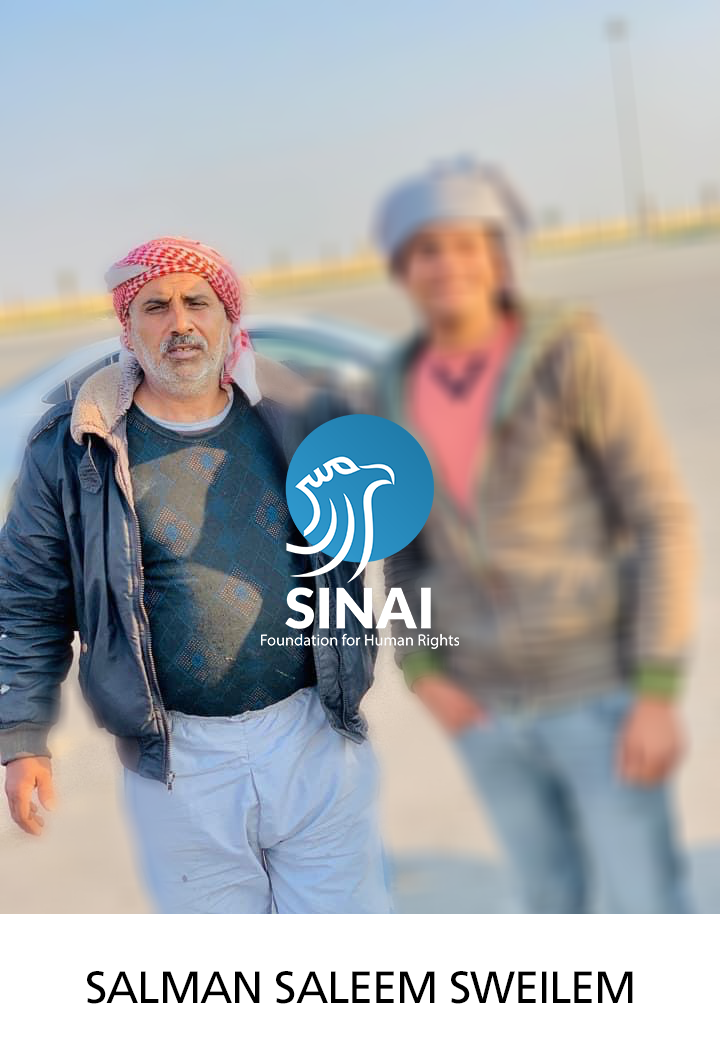
On 30 January 2022, the foundation team documented the injury of the two children Mahmoud Ahmed Suliman Obaid, 9, and Israa Ahmed Suliman Obaid, 10, as a result of the explosion of an explosive device in al-Obaidat neighborhood in al-Kharouba village southern Sheikh Zuwayed.
The foundation team met with a relative of the children’s who said: “My brother and his family returned to their village a month ago. When they returned, they didn’t find a house. It was a terrible shock when they found their house and life’s work as rubble. They didn’t have anywhere else to live, so my brother decided to build a shack to live in with his children, wife, and mother, and he started working on his land once again and seeing into the compensation process so he can build a small house for them to live in. One day the children went outside to play with their neighbors near the house.
Thankfully, my brother was aware of the issue of the explosives and once they returned, he combed through the entire land last week and didn’t find anything. We knew we could find exploding devices so he swept the land and when he didn’t find anything, he let the children play.
The children went to play and barely half an hour later, we heard an explosion. We ran, and none of the other children was injured, just my brother’s two children. His wife screamed when she saw Mahmoud’s leg completely lacerated and his other leg also injured. People gathered pieces of flesh that scattered and quickly took the kids to al-Arish hospital. The doctors there amputated Mahmoud’s left leg, and there was a deep wound in his right leg, but it wasn’t amputated. They examined Israa’s body and stomach for shrapnel and removed what they could and said that the body would expel the rest and that it was dangerous for them to surgically intervene in the places of the other pieces of shrapnel”.
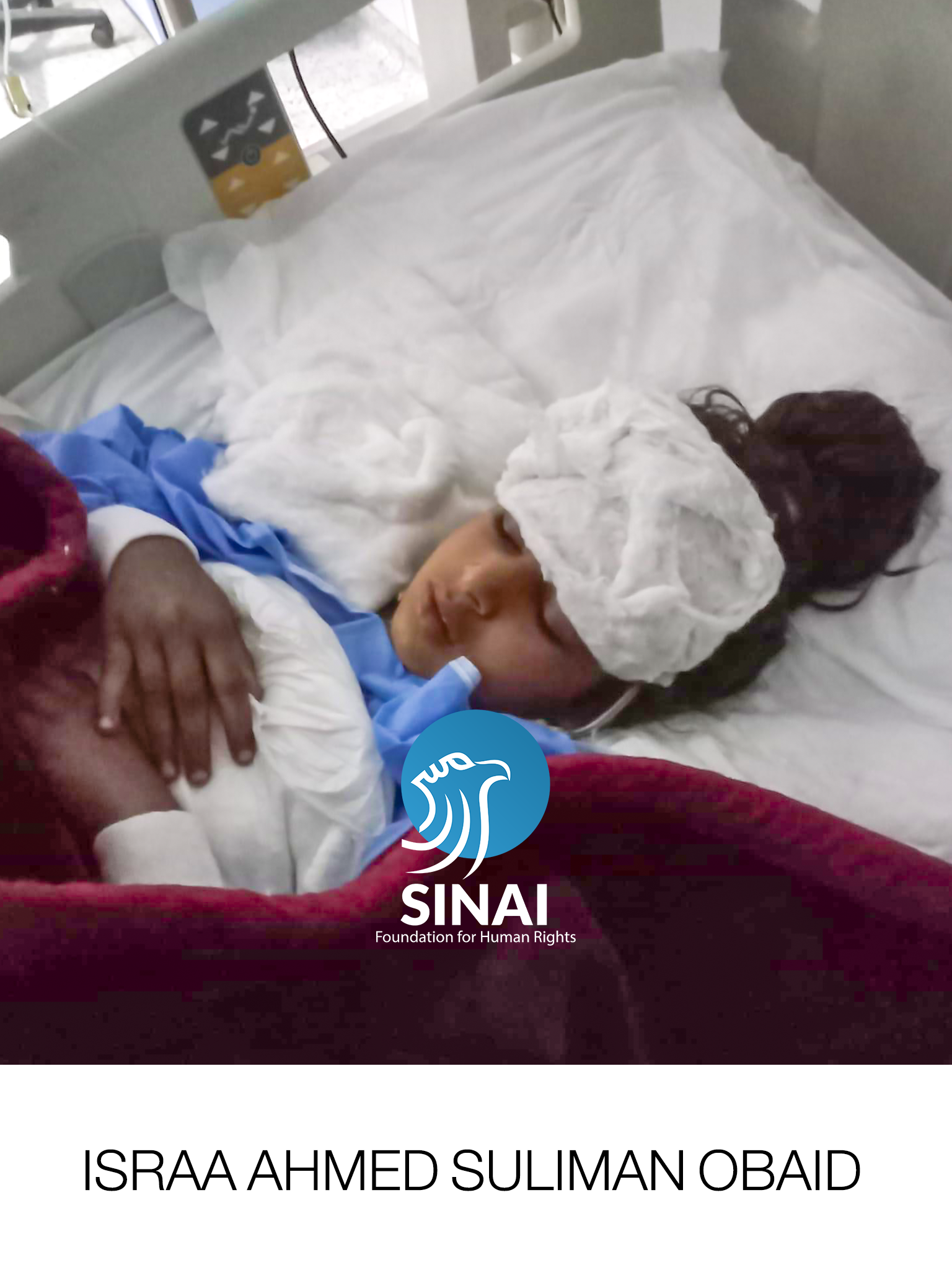
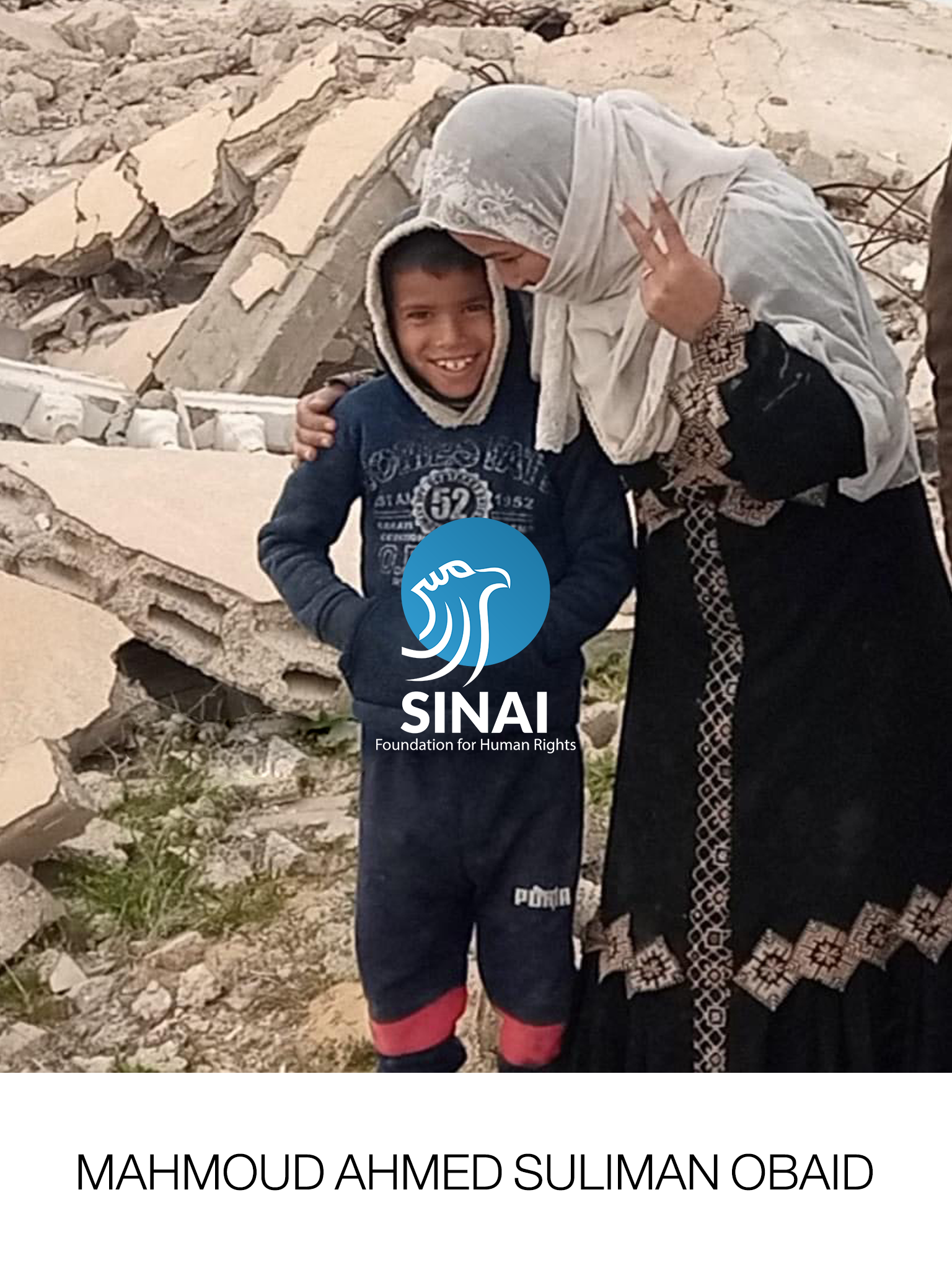
It is worth mentioning that the explosion of explosive devices and foreign objects planted or left behind by the group in the streets and houses of villages after withdrawing from them is a common pattern of abuse systemically practiced by ISIS.
The Sinai Foundation documented multiple similar incidents during previous months that led to the fall of several civilian victims. Despite the fact that ISIS planted those devices and bears legal responsibility for those attacks, the Egyptian authorities, after regaining control of the land in those areas, is responsible for protecting the lives of civilians by inspecting, combing through, and absolutely securing the area before telling civilians of the possibility of their return to guarantee the protection of lives.
The Sinai Foundation previously issued multiple releases after similar incidents where tens of civilian victims fell, appealing to the Egyptian authorities to take its legal and ethical responsibility towards civilians and not allow their return to areas that were under ISIS’s control before completely purging them.


